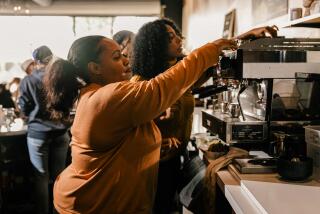The Hills Bros. ‘Turk’ and Other Tales
- Share via
SAN FRANCISCO — Twenty-two years after he retired as a vice president and director of Hills Bros. Coffee Inc., 86-year-old T. Carroll Wilson still takes time off from his other job as an office building manager once a week to come to the Hills Bros. corporate headquarters here.
With a team from the Sausalito, Calif., firm of Oral History Associates, Wilson--who was hired as a warehouseman in 1924 after being introduced to the firm by the Hills brothers themselves--is working to catalogue the hundreds of coffee-related artifacts and set down a history of the 110-year-old company.
“He is a walking history book and sharp as a tack,” says Paul Nishijima, who has been interviewing the octogenarian for Oral History Associates. “He is a treasure for the company and for the industry. When you listening to him, you can learn about the evolution of a major consumer product.”
Wilson works out of a small office carved out of an abandoned machine shop that is crammed with Hills Bros. memorabilia. “It’s not history to him,” says a Hills Bros. spokeswoman. “It’s his life.”
Old cans and bottles line the shelves, pictures spill out of file cabinets and advertising posters from a bygone era line the walls. A larger than life wood and plaster Hills Bros. “Arab” in his flowing yellow robe dominates a corner.
“He is not a true Arab,” Wilson insists. “He is not a true anything. “He is an artist’s impression of a Middle Eastern character. Maybe he’s a Turk.”
Whatever his background, the bearded character in a turban has become a powerful marketing symbol for Hills Bros. since his introduction in 1898 to promote the company that was first known as Arabian Coffee & Spice Mills. Wilson, whose long list of jobs at the company included director of advertising, says he even once toyed with using the slogan “Remember the Man--You’ll Remember the Can” in the product’s advertising.
Promotion, in fact, is what Wilson does best, noting that in 1900 the company was the first coffee roaster to package in vacuum cans.
“That was the thing that allowed companies to market outside of their own areas because it prolonged the shelf life so much,” he says. “We have opened and tasted coffee 25 years old that is still in fresh and usable condition.”
More to Read
Inside the business of entertainment
The Wide Shot brings you news, analysis and insights on everything from streaming wars to production — and what it all means for the future.
You may occasionally receive promotional content from the Los Angeles Times.









